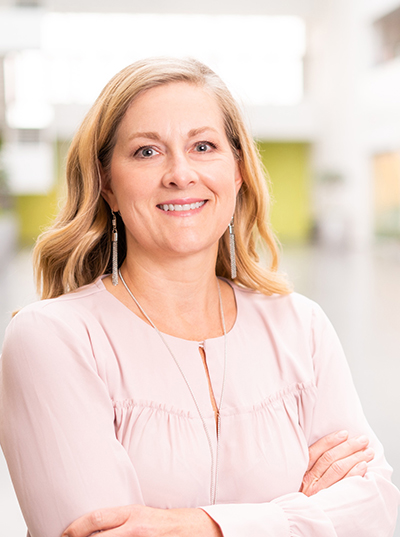
Amy Baker
Stange Award for Meritorious Service
No way was Amy Baker’s career path going to led to her becoming a veterinarian. No way in the world.
Her father, Dr. Butch Baker, was a veterinarian and had a mixed animal practice. Baker recalls her dad’s message to her.
“He said, ‘do something else where you don’t have to work so hard,’” Amy Baker said. “I resisted the call to do veterinary medicine as a young adult because of the long hours and the physical demands of the job that I saw my dad and his practice partners put in.”
Amy Baker’s calling was something else.
“I was going to be a medical doctor, a psychologist, a swine genetist,” she said. “I could have done those jobs.”
After completing her undergraduate degree at Western Kentucky University Baker started graduate courses at Iowa State, earning a master’s in genetics.
But the pull of the family career was just too much for her.
“When I imagined the possibilities of being a veterinarian doing infectious disease research I knew my career path,” Baker said, “and despite what he had said to me, my dad was pretty excited when I committed to becoming a DVM.”
And what a DVM. Baker is a superstar DVM (2002) as a research veterinary medical officer and lead scientist at the National Animal Disease Center in the U.S. Department of Agriculture in Ames. Among her achievements, she has led a research team in profiling the genetic evolution of swine influenza A viruses and how this affects the animals’ immune response to the pathogens.
She also initiated a global nomenclature system to expedite vaccine selections, strain identification and comparisons, and studies of viral evolution and “mixing,” whereby influenza strains from different hosts species exchange their genes.
But that’s not all. Baker was instrumental in establishing a national influenza A virus surveillance system in collaboration with the USDA’s Animal and Plant Health Inspection Service and the Centers for Disease Control and Prevention.
“I exclusively study influenza and it keeps me engaged,” Baker said. “There are lots of variants, it isn’t just one virus.”
Baker describes the variety of influenza as being “SARS-CoV-2 on steroids.”
“There are more ways influenza viruses can evolve than coronaviruses can do, through host jumps and gene segment swapping” she said. “This is a global issue and I’m as worried about the unknowns as much as I am about the knowns.”
Baker’s work in this area led to her election in 2020 to the National Academy of Medicine, one of the highest honors in the fields of health and medicine. Her numerous awards also include the Arthur S. Flemming Award for her exceptional scientific achievements in the field of animal health.
For that award, Baker was just one of 12 award recipients in 2019 across the entire Federal Government. “I definitely feel humbled when I get nominated for an award and I’m surprised when the selection committee picks me,” Baker said.
“I have had the opportunity to often be the one on the stage being honored, but all of this wouldn’t be possible without the outstanding team of colleagues I work with.
“There is no better place than Ames, Iowa, to do what I do.”
Despite the success Baker has had in her field, she’s not satisfied.
“I’m still on the hunt for better vaccines to use in pigs,” she said. “Influenza is a fascinating virus and it’s not going to get boring.
“I still get excited. I love my job and the influenza research community I work with. It is almost like I knew what I was doing all those years ago when I started on this journey.”
